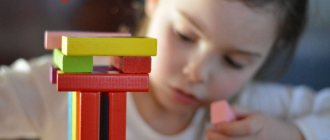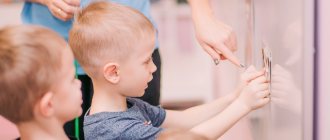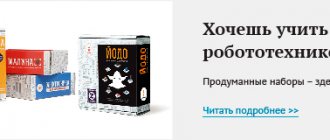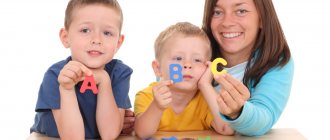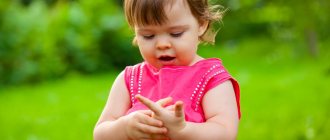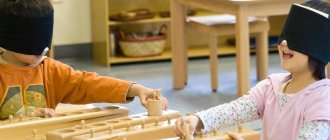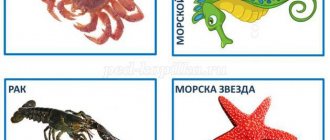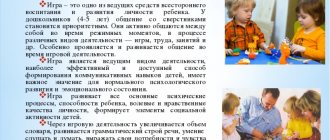To the authors
Magazine “Modern preschool education. Theory and Practice" publishes original popular scientific, educational, methodological or practice-oriented works devoted to the problems of development of preschool children and preschool education in Russia and abroad.
Magazine “Modern preschool education. Theory and Practice”, first of all, considers review articles that reveal the state of affairs within the framework of a given problem; empirical (research) articles; articles that present original methodological tools. Particular attention is paid to articles that reveal the experience of raising and educating children in specific countries. The magazine also publishes messages on past international scientific and other significant events in the world of preschool education, sent no later than 1 month after the event.
Features of the development of preschool children
Irina Lyubushkina
Features of the development of preschool children
1. Features of the development of preschool children
Preschool age covers the developmental period from 3 to 7 years . During preschool childhood, the child’s entire mental life and his attitude to the world around him are restructured. The formation of internal mental life and internal self-regulation is associated with a number of new formations in the psyche and consciousness of a preschooler .
The social situation is changing. New personal qualities and character traits are intensively formed. Preparations are being made for an important event in the life of every child - entering school.
the leading means of communication in a preschool . Answering questions helps the child expand his familiarity with the surrounding reality. The adult's answer is very important. It must be serious and understandable.
The leading activity of a preschooler is role-playing play. Through play, children gain new knowledge about the world around them, clarify their existing ideas, and regulate their relationships with peers. The game helps children manage their behavior and make practical, important decisions that are new to them.
Preschool age is the main age for the development of a child’s cognitive processes. The thinking of a preschooler develops from visual-effective (in infancy)
to the visual-figurative.
This allows the child to establish connections between objects and their properties. This age is characterized by the development of memory , it is increasingly isolated from perception. First, voluntary reproduction is formed, and then voluntary memorization. Imagination is one of the most important new formations of preschool age . imagination allows a child to build and create something new, original, which was not previously in his experience. And although the elements and prerequisites for the development of imagination are formed at an early age , it reaches its highest flowering precisely in preschool childhood .
Another important new development of this period is the emergence of voluntary behavior. In preschool age, the child’s behavior goes from being impulsive and spontaneous to being mediated by norms and rules of behavior.
The transition period from early to younger ages is marked by the 3-year-old crisis. The child’s self-awareness is developing, his own “I”
-Negativism is a reaction of denial to an adult’s demand or request, the desire to do the opposite.
- Stubbornness - the child insists on something not because he wants it, but in order to have his opinion taken into account.
- Self-will - the child accepts only what he has come up with or decided himself
-Devaluation - a child may break a favorite toy (devaluation of old attachments to things, may begin to swear (devaluation of old rules of behavior, the child’s attitude towards other people and towards himself changes. He is psychologically separated from close adults.
The end of preschool age is marked by the seven-year crisis. At this time, important changes occur in the mental life of the child. L. S. Vygotsky defined the essence of these changes as the loss of childish spontaneity.
2. Professional qualities of a teacher
The specifics of professional activity impose certain requirements on a preschool . And in order to fulfill his professional duties, he must have certain personality qualities.
Professional orientation.
The basis of such personality quality as professional direction is interest in the teaching profession and love for children, pedagogical vocation, professional pedagogical intentions and inclinations.
Empathy.
This feeling is characterized by the ability to empathize and sympathize, to respond emotionally to the child’s experiences. preschool teacher , knowing the age characteristics of preschoolers , must carefully notice the slightest changes in the child’s behavior, show sensitivity, caring, kindness, and tact in relationships.
Pedagogical tact.
Tactfulness is a sense of proportion, which is manifested in the ability to observe the rules of decency and behave properly. When the teacher’s actions find the optimal combination of affection and firmness, kindness and exactingness, trust and control, humor and severity, flexibility of behavior and educational actions, we can talk about the teacher’s tact.
Pedagogical optimism.
The basis of pedagogical optimism is the teacher’s faith in the strengths and capabilities of each child. preschool teacher who loves children is always tuned to perceive their positive qualities. By creating conditions for the manifestation of the abilities of each child , the teacher helps the preschooler . An optimistic teacher is characterized by the ability to inspire, cheerfulness, and a sense of humor.
Culture of professional communication.
preschool teacher must be able to build proper relationships with children, parents, colleagues, that is, with all participants in the pedagogical process.
Firstly, have a high cultural level and impeccable behavior. Children are good imitators
, it is the behavior of the teacher that they imitate in the first place. Secondly, try to establish partnerships with parents, be able to prevent and resolve conflict situations. Thirdly, treat colleagues with respect and attention, exchange experiences, and accept criticism.
Pedagogical reflection.
Reflection implies the ability to analyze the steps taken, evaluate the results obtained and compare them with the planned goal.
Authority.
Parents' trust is the first step towards gaining authority. To enjoy authority among children , parents and colleagues means to receive appreciation of one’s moral qualities, culture, erudition, and dedication to the profession.
Among the necessary personality traits of a teacher, one can also highlight: conscientiousness, self-demandingness, initiative, patience and endurance. It’s good if a preschool knows how to make crafts, draw, sing well, and has acting skills. In this case, he will always be interesting to his students.
The teacher must be a creative person and have such qualities as creativity (originality, clarity, activity, imagination, concentration, sensitivity). A creative teacher is also characterized by such qualities as initiative, the ability to overcome the inertia of thinking, independence, determination, a sense of what is truly new and the desire to understand it, observation
Thus, the main professionally significant qualities are:
- pedagogical tact,
- pedagogical optimism,
- creativity,
- self-realization,
- pedagogical duty and responsibility,
— empathy.
Among the professionally important qualities of a teacher, experts highlight:
mastery of modern methods and technologies in the field of teaching and raising children
broad erudition
pedagogical intuition
high level of intelligence
highly developed moral culture.
3. Programs for the education and development of preschool children
The quality and effectiveness of preschool education are mediated by many factors, among which the educational program is not the least important.
All main preschool education programs can be divided into two types - comprehensive (or general education)
and so-called partial (specialized, basic
preschool education programs with a narrower and more pronounced focus).
comprehensive preschool programs development of the child . According to such programs, education, training and development occur in all directions in accordance with existing psychological and pedagogical standards.
Partial basic preschool education programs imply a main emphasis on any one area in the development and upbringing of a child. In this case, a comprehensive approach to the implementation of preschool education is ensured by the competent selection of several partial programs.
Comprehensive core preschool education
"Origins"
– a program in which due attention is paid to
the development of the child’s personality in accordance with his age . The authors offer 7 basic personal characteristics that must be developed in a preschooler . “Origins”
educational program , like other main
preschool education , takes into account the comprehensive and harmonious development of the preschooler and makes it its priority.
"Rainbow"
- in this program you will find 7 main types of activities typical for
a preschooler . They include play, construction, mathematics, physical education, visual arts and manual labor, musical and plastic arts, development and familiarity with the outside world. Development under the program occurs in all of the above areas.
"Childhood"
— the program is divided into 4 main blocks, each of which is a central element in the construction of
preschool education . There are sections “Cognition”
,
“Healthy lifestyle”
,
“Creation”
,
“Humane attitude”
.
«Development»
is
a special preschool education program , which is based on the principle of gradually increasing the complexity of educational, educational and educational tasks. The program provides a planned, consistent approach to preschool education and child development .
"Little one"
is a comprehensive program created specifically for
children under 3 years of age . It takes into account the specifics of early childhood and ensures maximum efficiency in solving educational problems specifically for children of this age category . Includes several blocks - “We are waiting for you, baby!”
,
“Myself”
,
“Gulenka”
,
“How will I grow and
develop ” .
Partial basic preschool education
"Cobweb"
,
“Young Ecologist”
,
“Our Home is Nature”
- these programs were developed for the purpose of environmental education
of preschool children . Accordingly, they instill in children love and respect for nature and the world around us, forming an environmental awareness, which is very important for preschool children .
"Nature and the Artist"
,
“Semitsvetik”
,
“Integration”
,
“Umka - TRIZ”
,
“Baby”
,
“Harmony”
,
“Musical Masterpieces”
,
“Design and Manual Labor”
preschool programs have one thing in common: they have a pronounced focus on creativity development and on the artistic and aesthetic perception of the world.
"I, you, we"
,
“
Development of children’s ideas about history and culture” ,
“I am a man”
,
“Heritage”
,
“Introducing
children to the origins of Russian folk culture” - the listed main
preschool education programs have a socio-cultural focus. They are designed to stimulate the development of spirituality , morality, cultural understanding and important social skills.
In addition, some programs set the highest goal of instilling patriotism as a valuable personality characteristic. "Sparkle"
,
“Play for health”
,
“Start”
,
“Hello!”
,
“Health”
- in these programs the emphasis is on the health improvement, physical
development of the preschooler and his physical activity.
The priorities are to instill a love of sports, an active and healthy lifestyle. There are even more specialized core preschool . For example, the Safety Fundamentals
involves preparing
preschoolers for possible danger situations, natural disasters and emergencies. “
Preschooler and Economics ” is a program designed for economic education and the formation of initial financial and economic ideas.
4. Teacher’s work with parents
preschool teacher is not only a teacher of children , but also a partner of parents in their upbringing.
What to rely on when working with parents:
1. Use positive communication skills.
1) We ask and listen to the child’s parents more than we point and give advice.
2) We often inform parents about the progress of achievements in the development of their child :
We use individual forms for sending information to families and obtaining information about them.
We let parents know that we are ready to discuss with them very important topics concerning their child.
We respond promptly and positively to suggestions, ideas, and requests from parents.
We inform parents about the strengths, achievements and positive character traits of the child during conversations and telephone conversations.
We help parents understand that they can have a significant positive impact on their child's life.
We involve parents in teaching their children , using forms that will make them feel at ease and comfortable;
We are ready to receive parents in the group at any time, throughout the day.
We help parents decide on paid educational services (clubs, in discovering their children’s abilities and talents .
Forms of working with families.
Group parent meetings.
Various forms of organizing such events:
"Round table"
with parents in a non-traditional form, setting, with the obligatory participation of specialists, a senior educator, at which to discuss current issues of education with parents. Participants communicate freely with each other.
Consultations for parents. They are close to conversations. The teacher strives to give parents qualified advice. Consultations can be planned, unplanned, individual, group, 3-4 times in each age group . Duration 30-40 minutes. Consultation requires preparation for the most meaningful answers from the teacher to parents. Which consultations parents are interested in can be determined in advance by interviewing parents or conducting a survey.
Questioning parents, one of the forms of working with parents. Parents can be different: talkative, silent, calm, uncontrollable, modest, shy, etc. Not everyone can share with the teacher about their family, their child, the difficulties and difficulties of parenting, successes . That’s why a survey is necessary to know the parents’ opinion, what they like, and what they need to work on, fix something.
Open classes for children.
Home visit.
All-Russian magazine "Pedagogical experience"
Magazine "Pedagogical Experience"
created to help educators, teachers and educators with the aim of accumulating, storing and using advanced pedagogical experience.
The magazine publishes exclusively original author's articles
.
The Pedagogical Experience magazine also holds all-Russian competitions
pedagogical excellence and all-Russian
conferences
for subject teachers and educators.
To participate in the competition, go to the “ Competitions
” section; to participate in the conference, see the “
Conferences
” section.
Authors of articles, participants in competitions and conferences are sent confirming diplomas of the All-Russian level in electronic or paper form. Diplomas can be included in a teacher’s portfolio or teacher’s portfolio for certification. The All-Russian magazine “Pedagogical Experience” is registered with Roskomnadzor and has a media registration certificate No. EL No. FS 77 - 64783.
We are waiting for your works!
Methodological center numi.ru
Dear teachers!
Your experience, your developments, your materials for classes can be an invaluable contribution to the general treasury of pedagogical materials. Publish and you will help tens of thousands of colleagues. When registering on this site, you receive a home page address and the opportunity to maintain your own blog, photo gallery, and print a portfolio of published materials. You can print certificates of publication yourself as soon as the publication appears on the pages of NUMI.RU
Kindergarten No. 34
Website for children and parents “Pochemuchka”
On the site you can find answers to many children's questions, for example, why does an elephant need a trunk or why does it snow. The site also has educational games and activities for children, online games, coloring books, useful articles for parents and much more.
Children's portal "Sun"
On the site you can find a lot of useful information: coloring books, games, postcards, wall newspapers and much more.
Website for children and parents “Chudesenka”
Children's songs and poems, games, cartoons, creativity, see this site.
Children's safety portal "Spas-extreme"
This site contains safety information. There is information for children and their parents here. Games, competitions, children's multimedia encyclopedia, reminders “Everyone should know this!” and much more.
Website "Motherhood"
A site where everyone will find something for themselves. There is everything for parents and their kids here. A large number of articles on various topics, many forums where you can find answers to all your questions and much more.
Information portal “Good Road of Childhood”
“The Good Road of Childhood” is the only newspaper in the country that has set itself the task of not only raising a little person to be a law-abiding citizen of his country, a real person with a moral and spiritual value system, but also to teach him safe behavior in life, on the road, a culture of interaction with everyone road users, protect them from accidents, preserve their lives and health, thereby ensuring the future of our children and the country. The newspaper is addressed to children, teachers, and parents. Her motto: “Let our children be alive, healthy and happy.”
Children's creativity and development
Coloring books, fairy tales, MP3 music, riddles, sayings, poems, crafts, how to learn to draw, flash games and coloring books.
Magazine "Parents Meeting"
The magazine provides readers with materials intended for parental self-education, for resolving family conflicts, and for establishing peace and harmony in the family. Parents' Meeting publishes the works of prominent educators, philosophers and psychologists of the past and present, as well as the opinions and creative works of parents reflecting their own experiences in raising children.
Publishing House "Children's Literature"
The publishing house "Children's Literature" is a state publishing house that publishes books for children of preschool and school age, one of the largest specialized publishing houses, encyclopedic in the breadth of its topics. General information about the publishing house, history. Catalog of books, including the series “Library of World Literature for Children”, “School Library”, “Book by Book”, “Know and Be Able”, etc. Section “Reading Circle” with recommended lists of books for children of different ages.
Non-profit electronic library "ImWerden"
Among the sections of the library are children's literature and the children's library “Lesenka”.
Thematic site “Early child development”
Author's development methods; educational materials; Online encyclopedia for children; materials on speech development; a school student's reference book, which allows you to systematize and supplement the knowledge of primary and secondary school students; a selection of outdoor games; video and audio materials for the development and education of children; thematic collections of children's poems; baby food from the first month of life; free online consultations with a pediatrician, psychologist, speech therapist; children's rights; as well as materials for future parents.
"World of Preschoolers" - educational site for children and their parents
Educational site about children for parents and kindergarten teachers. Notes from classes in kindergarten, scenarios of events for children, articles on the development of preschoolers, advice from a psychologist, advice from a speech therapist and other materials
"Twice Five" - a site for good parents
Articles, publications, fragments from books on issues of child psychology, education, development and training of preschool children. Description of educational games. Materials and guidelines for creating various crafts, sewing and knitting, modeling, appliqué, drawing, weaving and other types of children's creativity. Materials for the development and education of children: puzzles, puzzles, mini-encyclopedias, the book “Physics for Kids.” Pictures, cards, manuals, educational games available for download. Poems, fairy tales, stories for children. Materials and recommendations on issues of physical development and health of children. Annotated links to children's resources.
"Little Wizards"
A site that will help parents, educators and teachers select material for classes with preschool children. Here publications of specialists on issues of upbringing, education and health promotion of preschool children are collected. Today, these materials have different forms - these are articles, e-books, collections of riddles, finger games, physical education minutes, lesson notes, audio and video materials.
“Game and Children” - a magazine for parents
Materials of the latest issue, archive of issues since 2001, search for articles by headings: notes for the teacher, game teaching techniques, handicrafts, art, outdoor games, getting ready for school, family club, reading hut, conversations with parents, experiences and experiments and others .
"Prodigy: Early Development"
Materials for early (from 6 months) child development and education. The materials are classified according to the following headings: Russian language, mathematics, reading, the world around us, biology, history, drawing. The materials are presented in the form of computer presentations, as well as entertaining Flash cartoons and games. All developments are built taking into account the psychophysiological characteristics of children.
"Creating Talent: Early Childhood Learning Society"
Materials on various methods of early childhood development. Information about Waldorf pedagogy. Parent test online. Recommendations and advice from experts on the upbringing and development of children.
“World Of Children: The Child and His World” - a project for children and parents
The “Child and His World” project was created specifically to help parents organize leisure time and education for their children. The site presents: teaching aids and encyclopedias, books, audio fairy tales, music, cartoons, educational games, materials for parents, etc.
"BabyRoom" - materials for early development
Methods of early development according to Doman. Doman cards on various topics. Presentations on topics: fairy tales, man and his activities, wildlife, art. Nursery rhymes, lullabies. Didactic games. Articles about children and family relationships. Games for the little ones. Crafts (patterns for soft toys, clothes for Barbie).
"Detochka" - a site for reasonable parents
Articles and publications on the topics: family, pregnancy and childbirth, the first year, day after day, child health, nutrition, learning about the world. Educational and logic games. Baby talk. Books and magazines for parents. Book by Masaru Ibuka “After Three It’s Too Late.” Psychological and intellectual tests, family competitions and much more.
"Preschool education" from RIN.RU
Articles and publications on problems of education, materials for parents and teachers. Children's literature, poems, songs, fairy tales (MP3 format). Educational games. Tests. Scripts and other materials for the holidays. Horoscopes. Databases on preschool institutions.
"Doshkolenok" is a website for parents. Education, development, training and entertainment of preschool children
Developmental and educational materials (games, coloring pages, poems, tasks, crosswords, charades) on mathematics and speech development. Educational computer games available for free download. Active and quiet games, competitions, relay races. A picture dictionary of fine arts. Parent news feed. Parent forum.
Fairy tales for preschoolers
All-Russian electronic magazine "Preschool teacher"
The magazine "Preschool Education Teacher"
accepts
articles from preschool educators and teachers for publication with the issuance of a certificate of publication.
Based on the Roskomnadzor certificate of mass media registration El No. FS77-58257, publication in the electronic journal “ Preschool Education Teacher
” is equated to a federal-level publication and
is taken into account during certification.
To publish an article in the journal “Preschool Teacher”:
1. Prepare an article.
This could be a methodological development, lesson notes, holiday script, quiz, etc.
2. Design the article
. At the beginning of the article, indicate its title, full name of the author, position, organization, city. At the end of the work, provide a list of references used.
3. Fill out an application for publication
(download application)
4. Pay the registration fee
(see section "Payment")
5. Submit your article to the editor
(to the address
dou.ru
with the subject “Publication”) . Three files must be attached to the letter: - application for publication; — a copy of the payment document (scanned or photographed); - file with work.
All-Russian magazine “Preschooler. RF"
We offer teachers, psychologists, educators, methodologists, teachers and others the placement of creative material for the exchange of experience and the development of the younger generation. Articles and autobiographies with photographs can be sent to:
Magazine "Doshkolnik.rf"
It comes out on
the 28th
of every month and is in
.pdf
format. Documents about publication in the journal are issued on the day payment is confirmed. You don't have to wait a month to receive them.
It does not have a paper version, but nevertheless has a media license and is registered with Roskomnadzor.
Usually teachers print out for Certification
page with Authors, Contents and your page.
To obtain a Certificate of Publication
You need:
Send your material to:
You can order a Certificate by sending an application to the address marked “Order Certificate”;
At the moment, all documents are sent only electronically.
The processing time for documents after payment is 1 day.
home
A preschool child is growing in your family! And the questions, problems and joys of his upbringing, education and development interest you. I want his life to be bright, rich and interesting. On my home page “TWICE FIVE” you will find useful and interesting information for yourself and your child. Share your finds, ideas, tutorials, tell us about yourself and your baby.Read the site news accordingly in the news. Game - For a preschooler, so far everything: activity, education, and development is a game! And there is a temptation to throw everything into this section, but I will try to post games here in their pure form. Workshop - we mold, sew, knit, fold, glue, grow. we decorate and decorate... and then we admire, admire the result... The method room - voluminous documents, programs, lesson notes, books, may arouse the interest of specialists (mainly for them and at their request, all this was scanned) and those parents who show serious interest in education of the child and has enough free time to read it all. Class - this will include games and activities with the child with a pronounced cognitive and educational focus, logical puzzles and assignments, puzzles, information for the curious. Something between a “game room” and a “methodological room”. Library - several fairy tales and stories, many poems, many links to other sites with poems. It would be more correct to call it a poetry library. A chest of pictures, cards, manuals, educational games, books for reading - homemade! Download, print, play! Well, maybe you need to do a little work first: stick it on cardboard, cut it, paint something, etc. Psychologist - several interesting journal articles. First aid station and Gym - a little prevention, a little treatment, useful exercises. I don’t think that these sections will be actively replenished. Is it just links to other sites? The kitchen is a very vague prospect, and not because I don’t like to cook. Let's see. Living room - introducing my friends and guests. Do you have something to tell about your family, about your circle, studio, about your work (if it is related to children)? - You are welcome. Write. The land of Soviets - when you come up with something or do something like that, you’re bursting with pride for what you’ve done! Or I learned something that I had no idea about. Well, how can you not share your discovery or invention with the world?! Business card - more about yourself and your inspiration for those who want to look at us, learn more about us and, perhaps, make friends with us. Mail - I have high hopes. I hope to receive congratulations and wishes, not malicious criticism and constructive suggestions in unlimited quantities. Send links to your personal or favorite children's Internet resources. I will post it in the appropriate sections.
Good luck to all of us!
YULA - Elena Aseeva
Live journal "Methodochka"
One of the innovations introduced by the modernization of education into the certification of a teacher for a qualification category is the creation of a portfolio representing the teacher’s achievements over a certain period of time. The teacher must fill the portfolio with documents confirming his teaching qualifications: certificates and diplomas for participation in competitions, olympiads, certificates of publications in magazines, newspapers, certificates of dissemination of one’s own experience in online publications, completion of training for a teacher, participation in teacher certification , other materials.
